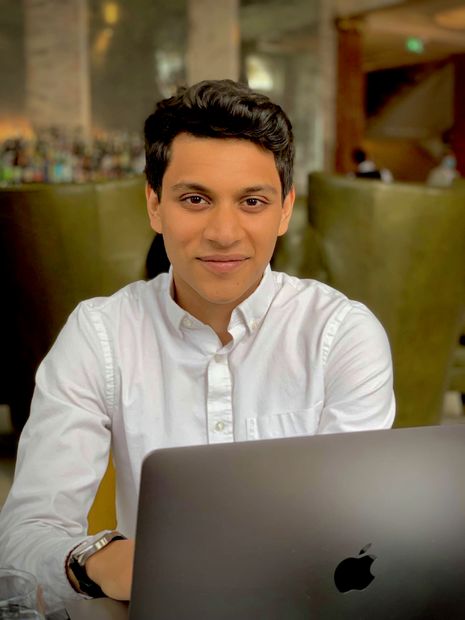Manas Chawla & London Politica – the student-run, pro bono political risk advisory firm
Olivia Millard speaks to the CEO of London Politica about leadership, the political risk industry and making your voice heard

For most students in their second year of a Bachelor’s degree, life tends to be busy. But Manas Chawla, as well as studying International Relations full-time at LSE, is also a CEO. Or, as he calls it, “a firefighter”. He reflects that being a CEO is just a question of “constantly putting away fires” as, from time to time, things can get hairy at London Politica, the world’s largest pro bono political risk advisory firm.
The idea for the firm was born from what Chawla essentially describes as a gap in the political advisory market. While interning at a political risk firm, he noticed that two groups were missing out in the industry as it stood: firstly, charities and small and medium-sized enterprises (SMEs) and secondly, students. Students miss out because of the opacity in the industry; for the most part, people transition into it with significant experience in other spaces such as law, academia and the Civil Service, meaning that it’s difficult for students to gain experience. For charities and SMEs, it is partly due to how the industry is structured: big conglomerates and small, niche consultancies stand at either end of the spectrum with little in between. Chawla decided to create something that would benefit both of these groups, and the result was a trailblazing, student-run, pro bono political risk advisory firm.
“He reflects that being a CEO is just a question of “constantly putting away fires”
From what Chawla says, there seems to be a need for change in the industry. He describes a growing disillusionment with amateur experts, opening up a much-needed space for fresh perspectives and original ideas. I ask whether potential clients approach cautiously, seeing that such a firm is a rarity in the industry. Chawla admits that there can initially be a level of suspicion, as 80% of the company are graduate students, and pro bono work is not common in the political risk world. But, he says, once they’ve explained what they’re doing and how they’re doing it (the team is mentored by an experienced advisory board of six), the suspicion dissipates. Transparency is Chawla’s top priority.

Logistically speaking, for London Politica the effects of Covid have been wholly positive. Chawla smiles and says “Covid is literally what has enabled me to do this.” He explains that the nature of the company’s value proposition, with a team based all around the world, has been strengthened by being able to work remotely. The effects of the pandemic have not only facilitated Chawla’s day-to-day work but have also been instrumental in leveraging the firm. Having begun as an exclusively LSE enterprise, Chawla and his team decided to take London Politica global, noticeably missing out the ‘national’ stage. This was a huge jump, but the risk paid off and they received over 500 applications to join the firm.
They tackle a vast variety of topics, countries and clients, from NGOs in Uganda to social unrest in Belarus. It seems that Chawla often has to act as a chameleon, adapting to new projects and acquiring niche knowledge exceptionally fast, for example having to “become an expert on Mongolian politics in under a month”. But it’s important to be intellectually honest, he says, if we can’t give sufficient insight or knowledge for a thematically specific task, we occasionally have to turn clients down.
“I ask why leadership appeals to him, and specifically why so in London Politica. Predictably perhaps, it’s the thrill factor”
Before founding London Politica, Chawla spent two years in Toronto with the G7 research group and began investigating whether their high profile summits were really succeeding in being as inclusive on an international level as they make out to be. He looked deeply into the relationship between the summits and their so-called “engagement groups”, analysing whether or not these groups produced legitimate numbers or whether, as results eventually suggested, they often “rubber stamped” them.
When I ask whether he believes the government is doing enough to platform young voices in politics at the moment, Chawla brings up the “rubber stamp” again. He explains that while the government does employ committees of young people to consult with, who then liaise with their own communities on various strategies, there is often a fatal lack of communication between the two groups, meaning that the final result rarely reflects the conclusions made by the youth representatives. This suggests that the government has work to do, if feedback from communities is rarely reflected in the ensuing policies. Chawla notes “it’s very hard to trace from point A to point B and see a reflection between what young people want and what is translated into policy on the ground.” He puts this down to a systemic lack of accountability.
“This suggests that the government has work to do, if feedback from communities is rarely reflected in the ensuing policies”
Chawla loves being a leader, but he recognises that it’s a privilege that can “spoil” you. He laughs and admits that learning to do things your way at the beginning of your career can become a point of conflict when moving to work in a bigger firm and you find yourself lower down the ranks, but he’s preparing himself for this shift. I ask why leadership appeals to him, and specifically why so in London Politica. Predictably perhaps, it’s the thrill factor. In a firm like London Politica, it’s impossible to know on a Monday what you’ll be working on come Friday. With a portfolio of a range of topics from, say, security risks in the Covid vaccine supply to engineering coral reefs, each new project presents a challenge, which Chawla seems to thrive on.
The key, he advises, is connections. For anyone looking to start out in the industry, reaching out to people and making your voice heard is the best thing you can do, be it via articles, a blog or a podcast. He recognises that it takes guts to do this, and requires a level of originality when discussing broad global matters, but it’s worth the risk. He puts part of his success down to the nexus of connections growing in and around London Politica and sticks by the idea that “increasing your surface area of opportunity” is key.
 News / Report suggests Cambridge the hardest place to get a first in the country23 January 2026
News / Report suggests Cambridge the hardest place to get a first in the country23 January 2026 News / Reform candidate retracts claim of being Cambridge alum 26 January 2026
News / Reform candidate retracts claim of being Cambridge alum 26 January 2026 News / Cambridge ranks in the top ten for every subject area in 202623 January 2026
News / Cambridge ranks in the top ten for every subject area in 202623 January 2026 Interviews / Lord Leggatt on becoming a Supreme Court Justice21 January 2026
Interviews / Lord Leggatt on becoming a Supreme Court Justice21 January 2026 Comment / Cambridge has already become complacent on class23 January 2026
Comment / Cambridge has already become complacent on class23 January 2026










